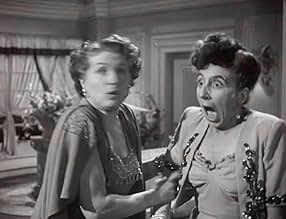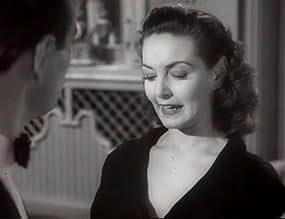Upper class young man has to resort to employment, together with his valet/butler in tow. He finds a job escourting a robot out for an evening, and they end up in a hotel and a farce ensues ... Read allUpper class young man has to resort to employment, together with his valet/butler in tow. He finds a job escourting a robot out for an evening, and they end up in a hotel and a farce ensues when roles are swapped.Upper class young man has to resort to employment, together with his valet/butler in tow. He finds a job escourting a robot out for an evening, and they end up in a hotel and a farce ensues when roles are swapped.
Anita Sharp-Bolster
- Lady Diana
- (as Anita Bolster)
Patti Morgan
- Telephonist
- (uncredited)
Geoffrey Sumner
- Well Dressed Man On Underground
- (uncredited)
Featured reviews
This is a movie very much of its time. That means some things have to be accepted in that context.
Movies based on plays often translate poorly to celluloid and perhaps that's the issue here.
The story and dialogue contain odd little holes and the humour sometimes seems places. Not quite forced but certainly not flowing from the story or situation directly.
The acting is good, especially from Patricia Roc and (the entirely silent) Pamela Devis.
The real credit I can give this movie is that I still really enjoyed it. If someone put the original play on, even AmDram, I'm pretty sure I'd be getting tickets!
Movies based on plays often translate poorly to celluloid and perhaps that's the issue here.
The story and dialogue contain odd little holes and the humour sometimes seems places. Not quite forced but certainly not flowing from the story or situation directly.
The acting is good, especially from Patricia Roc and (the entirely silent) Pamela Devis.
The real credit I can give this movie is that I still really enjoyed it. If someone put the original play on, even AmDram, I'm pretty sure I'd be getting tickets!
As a British attempt to do some American 'screwball' comedy, it falls very short of the mark. Perhaps the same vehicle in the hands of someone like Cary Grant could have made it work but not the set of actors in this. As a traditional British farce it works better but not by much, and sadly points up the fact that light comedy was not really Nigel Patrick's forte.
In a short role as a effeminate dress sales clerk, Jerry Desmonde goes as far as you could without shouting out 'gay man,' in the days of fifties cinema. Pity his later roles were mainly playing stooge to the likes of Norman Wisdom.
This type of broad slapstick farce and comedy of errors was slowly dying out to be replaced by the more subtle Ealing comedies. And wouldn't really return till the more risqué Carry Ons of the swinging sixties.
All a bit dated in all and only vaguely amusing in the sense of 'they don't make them like that any more' type of way.
In a short role as a effeminate dress sales clerk, Jerry Desmonde goes as far as you could without shouting out 'gay man,' in the days of fifties cinema. Pity his later roles were mainly playing stooge to the likes of Norman Wisdom.
This type of broad slapstick farce and comedy of errors was slowly dying out to be replaced by the more subtle Ealing comedies. And wouldn't really return till the more risqué Carry Ons of the swinging sixties.
All a bit dated in all and only vaguely amusing in the sense of 'they don't make them like that any more' type of way.
"The creation of perfect women appears a self-defeating pursuit since", the late Philip Strick once wrote, "there are so many of them around already".
Although this truly bizarre farce seems on paper crying out for a disclaimer on Talking Pictures deploring it's attitude to women, it's actually the men who are portrayed as useless (no mean feat when played by the usually accomplished Nigel Patrick & Stanley Holloway) and the audience is laughing with Patricia Roc and Irene Handl rather than at them.
Plushly appointed but very silly, with Mickey Mousing music cues which which make it even more unfunny than it already would have been; it was dismissed by Denis Gifford as "heavy-going froth". And I'll go along with that.
Although this truly bizarre farce seems on paper crying out for a disclaimer on Talking Pictures deploring it's attitude to women, it's actually the men who are portrayed as useless (no mean feat when played by the usually accomplished Nigel Patrick & Stanley Holloway) and the audience is laughing with Patricia Roc and Irene Handl rather than at them.
Plushly appointed but very silly, with Mickey Mousing music cues which which make it even more unfunny than it already would have been; it was dismissed by Denis Gifford as "heavy-going froth". And I'll go along with that.
A promising cast and premise are wasted in this woefully weak effort. The absence of a sharp script and tight direction is made worse by desperate over-acting. The participants were rewarded for the time they spent on the film. Unlike the viewers.
The Perfect Woman (1949) -
It really was amazing how quickly two people could fall in love back in 1949 - That was the only note I took down whilst watching this film and sadly, because it was a bit forgettable, I can't really think what else to write about it in this review.
I know that it wasn't offensive and that there was a charm to it and an element of fun, but I don't think that I could really say much about the general construction of the film.
The only characters I can recall were the professor who invented the "Perfect Woman" and who was cute in his own way, but quite typical of inventors in film and also Stanley Holloway's butler, a man who knew his place, but didn't stay there.
I'm sure that they all gave perfectly adequate performances, because otherwise I would have made a note of it and I know that Irene Handl usually delivers a great character, but perhaps there have just been too many of this type of film that meant it didn't leave a specific mark.
The actual robot needing instructions to move or do anything, was a bit silly, like the daft scene in 'Mrs Doubtfire' (1993), where Robin Williams had to keep changing personas over dinner and that was a tired humour even in 1949 as far as I'm concerned.
So while it wasn't a bad film, it really didn't make any kind of impression on me and I wouldn't bother with it again.
380.61/1000.
It really was amazing how quickly two people could fall in love back in 1949 - That was the only note I took down whilst watching this film and sadly, because it was a bit forgettable, I can't really think what else to write about it in this review.
I know that it wasn't offensive and that there was a charm to it and an element of fun, but I don't think that I could really say much about the general construction of the film.
The only characters I can recall were the professor who invented the "Perfect Woman" and who was cute in his own way, but quite typical of inventors in film and also Stanley Holloway's butler, a man who knew his place, but didn't stay there.
I'm sure that they all gave perfectly adequate performances, because otherwise I would have made a note of it and I know that Irene Handl usually delivers a great character, but perhaps there have just been too many of this type of film that meant it didn't leave a specific mark.
The actual robot needing instructions to move or do anything, was a bit silly, like the daft scene in 'Mrs Doubtfire' (1993), where Robin Williams had to keep changing personas over dinner and that was a tired humour even in 1949 as far as I'm concerned.
So while it wasn't a bad film, it really didn't make any kind of impression on me and I wouldn't bother with it again.
380.61/1000.
Did you know
- TriviaPamela Devis's debut.
- Quotes
Mrs. Butters: You and your Mars and your Jupiter. Why don't you come down to Earth for a change?
Details
- Runtime
- 1h 29m(89 min)
- Color
- Aspect ratio
- 1.37 : 1
Contribute to this page
Suggest an edit or add missing content


































